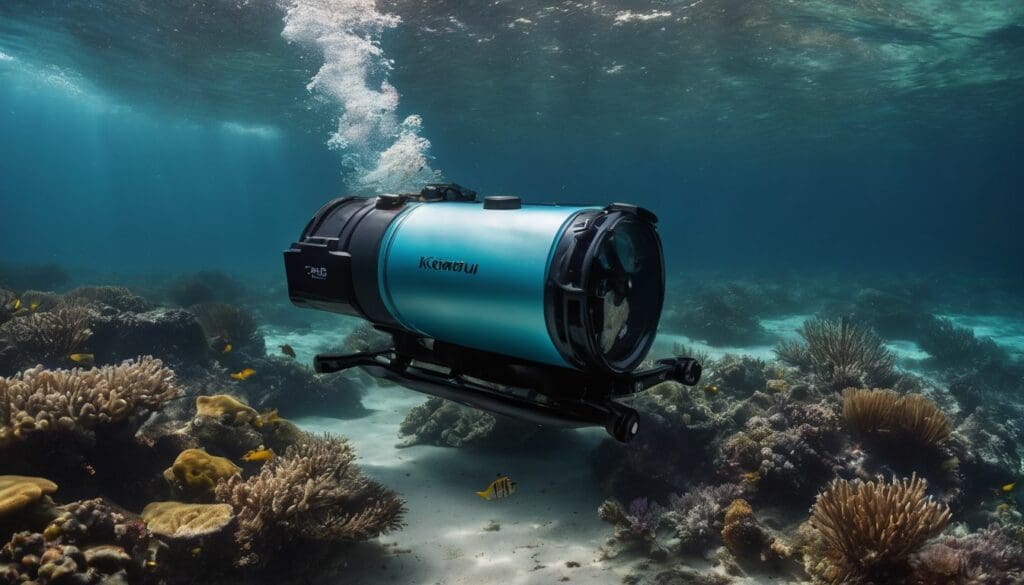As the sun rises over our blue planet, a silent crisis unfolds beneath the waves. Our oceans, brimming with life and mystery, are under siege by an invader of our own making: plastic pollution.
With years of experience diving into environmental challenges, I’ve witnessed the devastating impact firsthand—an estimated 75 to 199 million tons of plastic desecrating marine sanctuaries and suffocating wildlife.
But hope is not lost; we’re on a mission to turn the tide.
Our oceanic battle against this synthetic scourge takes form in ingenious Ocean Cleanup Technologies—frontline warriors reclaiming what’s been lost to carelessness. The goal? To extract these artificial contaminants before they fragment into dangerous microplastics that threaten ecosystems globally.
This voyage isn’t just about cleanup; it’s about preserving life itself for future generations—a vision underscored by partnerships including one with the United Nations Development Programme.
Be part of this crucial journey as we unravel solutions hidden within technology’s embrace. Read on—the sea calls for its saviours.
Key Takeaways
- The Ocean Cleanup is a non – profit organisation using advanced technologies to remove up to 199 million tons of plastic in our oceans, including innovative floating trash collectors and barriers along rivers.
- Plastic pollution affects marine life, the economy, and human health by releasing toxic chemicals and causing significant cleanup costs; efforts like beach clean-up initiatives aim to mitigate these problems.
- Technologies developed by The Ocean Cleanup prevent large plastics from breaking down into microplastics, with recent projects focusing on capturing these smaller particles before they cause further harm.
- Individuals can participate in battling ocean pollution by volunteering for clean – ups, spreading awareness about ocean waste, or partnering with organisations like The Ocean Cleanup to support their missions.
- Recognised globally for its impact on marine conservation through awards such as the United Nations Champions of the Earth award, The Ocean Cleanup collaborates with entities like the UN Development Programme to enhance their initiatives.
The Problem: Plastic Pollution in Our Oceans
Plastic pollution in our oceans is a pressing issue that affects marine life, the economy, and human health. The sheer volume of plastic waste in our seas calls for urgent action to address this environmental crisis.
The current state of ocean pollution
Ocean pollution has reached alarming levels, with estimates suggesting that 75 to 199 million tons of plastic are contaminating our seas. Vast swirls of waste create garbage patches, some spanning millions of square kilometers.
These areas consist mainly of macroplastics – large pieces of debris that over time break down into microplastics, posing even greater risks to marine life and human health.
The Ocean Cleanup is at the forefront in addressing this crisis by developing sustainable technology aimed at tackling ocean pollution. Their innovative solutions include floating barriers designed to corral floating trash and advanced systems for removing plastics from rivers before they reach the sea.
Despite considerable efforts to clean up marine debris, the challenge persists; every day more waste enters our oceans, indicating a pressing need for global action on waste management and environmental conservation.
Effects of plastic pollution on the environment, economy, and health
Plastic pollution devastates the environment, harming marine life and disrupting delicate ecosystems. As plastic waste accumulates in oceans, it poses a severe threat to wildlife, leading to entanglement or ingestion of plastic debris.
The ecological balance is disrupted as plastics release toxic chemicals and hinder photosynthesis in aquatic plants; this impacts natural habitats and biodiversity.
Furthermore, plastic pollution undermines the economy by negatively impacting industries such as fishing, tourism, and shipping. Additionally, cleaning up marine litter incurs substantial costs for governments and communities around coastal areas.
The Ocean Cleanup: A Non-Profit Mission
We at The Ocean Cleanup are dedicated to tackling the plastic pollution crisis in our oceans. As a non-profit organisation, our mission is to develop and scale technologies that can effectively clean up the ocean and reduce plastic waste.
Our mission and purpose
The Ocean Cleanup is committed to developing and implementing advanced technologies aimed at ridding the world’s oceans of plastic pollution. With a focus on removing plastic objects from the ocean while they are still at a larger ‘macroplastic’ size, our goal is to prevent them from breaking down into more harmful microplastics.
Partnering with organisations like the United Nations Development Programme, we are dedicated to eliminating plastic pollution globally and safeguarding marine life and ecosystems for generations to come.
Through innovative solutions and sustainable methods, we strive to make a significant impact in the ongoing battle against plastic pollution at sea.
Awards and recognitions
The Ocean Cleanup has received several awards and recognitions in acknowledgement of its pioneering work in tackling ocean plastic pollution.
- The organisation was honoured with the Katerva Award for demonstrating extraordinary potential to make a significant impact on marine conservation through innovative technology.
- The Ocean Cleanup received the United Nations World Oceans Day 30 – Day Challenge Award for its outstanding commitment to cleaning the oceans and preserving marine life.
- Through its dedication and achievement in developing sustainable ocean cleanup technologies, the organisation was recognised with the INDEX: Award, one of the most prestigious accolades for design innovation.
- Notably, The Ocean Cleanup was awarded the Champions of the Earth award by the United Nations Environment Programme, acknowledging its outstanding leadership in environmental conservation.
- The organisation’s founder and team have also been recipients of various individual accolades celebrating their contributions to ocean preservation and marine conservation efforts.
Our Approach: Developing and Scaling Technologies
We have developed innovative technologies to collect plastic from the oceans, clean up beaches, and remove plastic from rivers. Our approach also focuses on tackling microplastics and reducing ocean plastic through sustainable methods.
Collecting plastic from the oceans
The Ocean Cleanup utilises advanced technologies to collect plastic from the oceans. Innovative systems such as floating trash collectors are deployed to trap and gather ocean plastic, preventing its further spread.
The organisation’s focus on macroplastics ensures that larger plastic objects are targeted for removal, reducing the risk of them breaking down into harmful microplastics. With an estimated 1.8 trillion pieces of plastic in the ocean’s garbage patch, these efforts play a crucial role in combating marine plastic pollution and protecting marine life.
Advancements in sustainable ocean cleaning technologies have enabled the successful collection of significant amounts of ocean plastic by The Ocean Cleanup. Collaborations for ocean conservation allow for continued development and scaling up of these eco-friendly methods for ocean cleanup, contributing to global efforts to reduce and eliminate plastic waste from our seas.
Cleaning up beaches
Beach cleaning operations are vital for removing plastic waste that washes ashore. Trained volunteers and staff use eco-friendly methods to gather, sort, and recycle the litter found on the coastline.
This concerted effort helps prevent further pollution of oceans and shores by removing macroplastics before they degrade into microplastics.
Innovative technologies, such as plastic barriers strategically placed along coastlines, aid in collecting debris before it enters the open sea. These measures contribute significantly to reducing marine pollution while protecting coastal ecosystems from harmful plastic waste.
Removing plastic from rivers
Using innovative technology, we actively collect plastic waste from rivers before it reaches the oceans. Our efforts aim to intercept plastic at the source, preventing further contamination of marine ecosystems.
Floating barriers strategically placed along rivers help capture plastic debris, keeping this harmful material out of our seas. By focusing on removing plastic from rivers, we are taking a proactive approach to combat the global issue of ocean pollution.
Moving forward in our mission to tackle plastic pollution, let’s delve into how we are dealing with microplastics in the world’s oceans.
Tackling microplastics
After focusing on removing plastic from rivers, the next crucial step in our mission is tackling microplastics. These tiny plastic particles pose a significant threat to marine life and ecosystem health.
With an estimated 1.8 trillion pieces of plastic floating in the ocean’s garbage patch, it’s essential to prevent the further spread of microplastics – which have serious environmental and health risks.
The Ocean Cleanup is at the forefront of developing innovative solutions for capturing and filtering out microplastics from our oceans. By utilising advanced technologies and eco-friendly methods for ocean cleanup, we are working towards reducing the presence of microplastics while also preventing their further proliferation in marine environments.
Reducing ocean plastic
After addressing the challenge of microplastics, our focus turns to reducing ocean plastic. The Ocean Cleanup is dedicated to developing innovative solutions for this issue. By actively collecting and removing plastic waste from the oceans, we are making strides in decreasing the amount of harmful debris in marine environments.
Our eco-friendly methods for ocean cleanup also include recycling collected plastic to prevent further pollution. These efforts are crucial as there are currently between 75 to 199 million tonnes of plastic polluting the world’s oceans, according to the World Economic Forum.
Advancements in technology for ocean cleanup, such as specialised trash collectors, play a vital role in fighting against marine plastic pollution. Removing and reducing ocean plastics helps prevent them from breaking down into more harmful microplastics, ultimately safeguarding both the environment and human health.
Latest Updates and Projects
The latest updates and projects from the Ocean Cleanup include innovative initiatives like the returnable coffee cup project and the implementation of plastic barriers to collect litter.
Additionally, beach clean-up initiatives and our response to environmental emergencies are ongoing efforts in our mission to battle plastic pollution at sea.
Returnable coffee cup project
The Ocean Cleanup’s Returnable Coffee Cup Project aims to address the issue of single-use plastic waste by encouraging a sustainable alternative. With an estimated 16 billion disposable coffee cups used annually, this project focuses on promoting the use of reusable cups in cafes and coffee shops.
By offering incentives for customers who bring their own cup, such as discounts or loyalty points, the initiative seeks to reduce the staggering amount of plastic waste generated by takeaway coffee culture.
This eco-friendly approach not only minimises plastic pollution in our oceans but also contributes to a more environmentally conscious society that actively supports conservation efforts.
In addition to reducing single-use plastic consumption, the Returnable Coffee Cup Project emphasises education and awareness about the impact of disposable products on marine environments.
Collaborating with local businesses and communities, The Ocean Cleanup is working towards creating a significant shift in consumer behaviour regarding daily habits such as purchasing beverages in disposable containers.
Plastic barriers to collect litter
Plastic barriers are being deployed to capture floating litter in the ocean. These innovative structures act as a physical barrier, preventing plastic waste from spreading further and causing harm to marine life.
By strategically placing these barriers in key areas, we can effectively intercept plastic before it disperses into smaller, more harmful microplastics that are challenging to clean up.
The use of plastic barriers is an important step in our efforts to combat the overwhelming issue of ocean pollution and protect our marine ecosystems.
As we continue developing new technologies and strategies for cleaning up the oceans, it’s crucial to explore all available options for capturing plastic waste at sea. Plastic barriers represent one of many innovative solutions that contribute to our comprehensive approach towards battling plastic pollution at sea.
Beach clean-up initiatives
Ocean Cleanup Technologies is actively involved in organising beach clean-up initiatives to remove plastic waste from coastal areas. These initiatives bring together volunteers and local communities to collect and properly dispose of marine debris, preventing it from entering the ocean or harming wildlife.
Through these efforts, significant amounts of plastic pollution have been removed from beaches, contributing to a cleaner and healthier marine environment.
In addition to organised beach clean-ups, Ocean Cleanup Technologies supports community-led efforts by providing resources and guidance for individuals and groups who want to organise their own clean-up activities.
Responding to environmental emergencies
In addition to beach clean-up initiatives, our organisation is prepared to respond swiftly to environmental emergencies. Our team mobilises cutting-edge technologies and resources when natural disasters or industrial accidents threaten marine ecosystems.
Recent projects have demonstrated swift and effective responses that safeguard the delicate balance of marine life amid unforeseen crises. These initiatives are crucial in protecting ocean habitats from immediate harm, maintaining the health of vital ecosystems, and preventing long-term damage caused by pollution and debris displacement.
How You Can Help
Get involved by volunteering for our beach clean-up initiatives, spreading the word about ocean pollution, and partnering with us to support our mission. Click here to learn more about how you can make a difference in battling plastic pollution at sea.
Volunteering opportunities
Get involved in our ocean cleanup efforts and make a meaningful impact by volunteering with us. Embrace the opportunity to contribute to a cleaner environment and healthier oceans through the following activities:
- Participate in beach clean – up initiatives, helping remove plastic waste from our coastlines and prevent it from entering the ocean.
- Join our returnable coffee cup project, promoting eco-friendly practices and reducing single-use plastics that contribute to ocean pollution.
- Engage in responding to environmental emergencies, assisting in quick and effective cleanup efforts when disasters strike.
- Contribute your time and skills to the development of innovative solutions for marine plastic cleanup, supporting our ongoing mission to rid the oceans of plastic pollution.
- Spread awareness about plastic recycling and reduction of plastic waste, educating others on sustainable practices to safeguard our oceans for future generations.
- Partner with us to organise local community events focused on environmental conservation, creating a network of supporters dedicated to preserving marine ecosystems.
- Collaborate with schools and educational institutions to promote environmental education and inspire young generations to become stewards of ocean conservation.
Spreading the word
Spread awareness about the Ocean Cleanup’s mission and encourage others to join the fight against plastic pollution in our oceans. Share our success stories, such as the innovative returnable coffee cup project and beach clean-up initiatives, on social media platforms to inspire others to take action.
Engage with local communities and schools by organising educational events to raise awareness about the impact of plastic pollution on marine life and ecosystems. Utilise partnerships with other environmental organisations or businesses to reach a wider audience and increase support for ocean cleanup efforts.
Encourage your friends, family, and colleagues to get involved by sharing information about volunteering opportunities with the Ocean Cleanup. Join forces with like-minded individuals who are passionate about preserving our oceans by partnering with us in spreading crucial messages through workshops, community events, or online campaigns.
Partnering with us
Join us in our mission to clean up the oceans by becoming a partner. Your support can help us develop and scale advanced technologies to remove plastic from the sea, tackle microplastics, and reduce ocean pollution.
By partnering with The Ocean Cleanup, you can contribute to the restoration of marine ecosystems and protect wildlife from the harmful effects of plastic waste. Together, we can make a significant impact on battling plastic pollution at sea.
As a partner, you can also join beach clean-up initiatives and participate in responding to environmental emergencies. Volunteering opportunities are available for individuals who want to get involved directly in our projects.
Conclusion
In conclusion, ocean cleanup technologies play a crucial role in battling plastic pollution at sea. Advanced methods are being developed and scaled to collect plastic from the oceans, clean up beaches, remove plastic from rivers, and reduce ocean plastic.
The Ocean Cleanup’s ongoing efforts are vital in preventing the further spread of harmful microplastics and protecting our environment for future generations. Get involved by volunteering, spreading the word, or partnering with us to make a tangible difference in combating ocean pollution.
FAQs
1. What are ocean cleanup technologies?
Ocean cleanup technologies refer to innovative methods used to remove plastic waste from the sea, focusing on clearing marine debris and restoring clean water.
2. Why is the ocean cleanup project important?
The ocean cleanup project is crucial because it tackles the growing problem of plastic pollution, safeguarding marine life and preserving ecosystems.
3. Are eco-friendly methods being used for cleaning up the oceans?
Yes, those developing ocean cleanup solutions prioritise eco-friendly approaches to ensure that removing plastics does not harm sea environments or organisms.
4. How can we help with removing plastic from the sea?
Individuals can contribute by reducing their use of single-use plastics, supporting organisations involved in cleaning up marine debris, and promoting awareness about ocean health issues.





